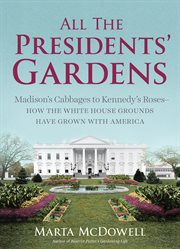Nonfiction
eBook
Details
PUBLISHED
Made available through hoopla
DESCRIPTION
1 online resource
ISBN/ISSN
LANGUAGE
NOTES
A New York Times Bestseller and AHS Book Award winner The 18-acres surrounding the White House have been an unwitting witness to history-kings and queens have dined there, bills and treaties have been signed, and presidents have landed and retreated. Throughout it all, the grounds have remained not only beautiful, but also a powerful reflection of American trends. In All the Presidents' Gardens bestselling author Marta McDowell tells the untold history of the White House grounds with historical and contemporary photographs, vintage seeds catalogs, and rare glimpses into Presidential pastimes. History buffs will revel in the fascinating tidbits about Lincoln's goats, Ike's putting green, Jackie's iconic roses, and Amy Carter's tree house. Gardeners will enjoy the information on the plants whose favor has come and gone over the years and the gardeners who have been responsible for it all. All the Presidents' Gardens tells the untold history of the White House Grounds. Starting with the seed-collecting, plant-obsessed George Washington and ending with Michelle Obama's focus on edibles, this rich and compelling narrative reveals how the story of the garden is also the story of America. Marta McDowell lives, gardens, and writes in Chatham, New Jersey. She consults for public gardens and private clients, writes and lectures on gardening topics, and teaches landscape history and horticulture at the New York Botanical Garden, where she studied landscape design. Marta's particular interest is in authors and their gardens, the connection between the pen and the trowel. She is the 2019 winner of the Garden Club of America's Sarah Chapman Francis Medal for outstanding literary achievement. Her books include Beatrix Potter's Gardening Life, All the Presidents' Gardens, World of Laura Ingalls Wilder, Emily Dickinson's Gardening Life, and Unearthing the Secret Garden. Visit her at martamcdowell.com. Preface The United States was too big. For a topic, that is. When my editor suggested I might write a history of American gardening, I sat at my desk. Stunned. It seemed a subject broad as a sea of grass, long and muddy as the Mississippi, elusive as a white whale that would, after a mad, obsessed chase, drag me under. Regional differences are vast. What grows happily for friends in Denver sulks, then dies, in my humid New Jersey garden. Then there are questions of influence that vary across the wide waist of the continent: the Spanish with their patio and courtyard gardens from Florida to California, the tidy colonial gardens of New England, the immense plantations of the antebellum South. And with more than five-plus centuries, depending on how you count, the players involved in American horticulture and landscape design are legion. Two people convinced me to take on this quest-one dead, one alive. The reason I study, teach, and write about garden history is because of Beatrix Jones Farrand (1872-1959). On my first visit to the grounds of Dumbarton Oaks in Georgetown in the 1980s, I was smitten with it and Farrand, its designer, one of the country's first landscape architects. It was about Beatrix Farrand that I taught my first class at the New York Botanical Garden. Some years later one of my landscape history students, Seamus Maclennan, chose the White House grounds as the topic for his final project. It was riveting, a fifteen-minute chronicle of change in one of America's most recognizable landscapes. There were victory gardens and flowerbeds, glasshouses and putting greens, all set in the context of American history. For the problem now before me, it would set bounds, but also pull in a cast of characters and a VIP setting. Before I embarked on this undertaking Seamus graciously gave me leave to use his idea, proving once again, if you want to hum along with the Rodgers and Hammerstein tune, "that if you become a tea
Mode of access: World Wide Web







